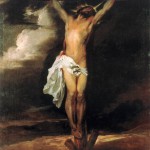In the wake of Friday’s tragedy, today’s call to “Rejoice” is a difficult one. But as Deacon Greg reminds us, even that call is shot through with the promise of suffering:
“The Lord is near.” He knows what it’s like.
And He knows what we need: hope. And He has given it to us. The Passion of His son assures us of this: death doesn’t have the last word. We have been promised eternal life. We live in the hope of one day seeing God face-to-face – and seeing in His reflected light those we love.
This is the real promise and joy of Christmas: the salvation that was made real on Calvary began in Bethlehem.
…
The Lord is near. He walks with us. He weeps with us
The most thematically appropriate pieces composed for Gaudete Sunday speak either of our forthcoming escape from darkness — Samuel Wesley’s “The Wilderness or the Solitary Place” — or look joyfully ahead to Christ’s impending arrival — Bach’s “Herr Christ, der ein’ge Gottessohn.” But neither emotion is one that comes easily to me at the moment. Perhaps the best musical selection for this particular day is the somber chant from which today’s feast takes its name: “Gaudete in Domino” — a reminder that rejoicing in this vale of tears will never be entirely free of sorrow and supplication.
Gaudéte in Dómino semper:
íterum díco, gaudéte:
modéstia véstra
nóta sit ómnibus homínibus:
Dóminus prope est.
Nihil sollíciti sítis:
sed in ómni oratióne
petitiónes véstrae
innotéscant apud Déum.
Translation:
Rejoice in the Lord always;
again I say, rejoice.
Let your forbearance
be known to all men.
The Lord is at hand.
Do not be anxious over anything;
but in all manner or prayer,
let your requests
be made known unto God.
Attribution(s): “The Census at Bethlehem” by Pieter Brueghel the Elder. Provided by the Web Gallery of Art (Image, Info about artwork) and licensed under Public Domain via Wikimedia Commons.













